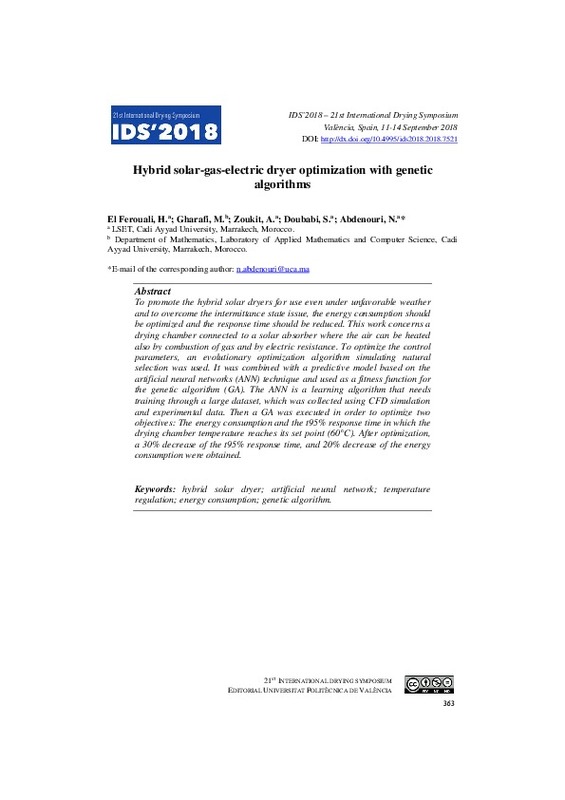JavaScript is disabled for your browser. Some features of this site may not work without it.
Buscar en RiuNet
Listar
Mi cuenta
Estadísticas
Ayuda RiuNet
Admin. UPV
Hybrid solar-gas-electric dryer optimization with genetic algorithms
Mostrar el registro sencillo del ítem
Ficheros en el ítem
| dc.contributor.author | El Ferouali, H.
|
es_ES |
| dc.contributor.author | Gharafi, M.
|
es_ES |
| dc.contributor.author | Zoukit, A.
|
es_ES |
| dc.contributor.author | Doubabi, S.
|
es_ES |
| dc.contributor.author | Abdenouri, Naji
|
es_ES |
| dc.date.accessioned | 2019-02-13T07:43:00Z | |
| dc.date.available | 2019-02-13T07:43:00Z | |
| dc.date.issued | 2018-09-07 | |
| dc.identifier.isbn | 9788490486887 | |
| dc.identifier.uri | http://hdl.handle.net/10251/116660 | |
| dc.description.abstract | [EN] To promote the hybrid solar dryers for use even under unfavorable weather and to overcome the intermittance state issue, the energy consumption should be optimized and the response time should be reduced. This work concerns a drying chamber connected to a solar absorber where the air can be heated also by combustion of gas and by electric resistance. To optimize the control parameters, an evolutionary optimization algorithm simulating natural selection was used. It was combined with a predictive model based on the artificial neural networks (ANN) technique and used as a fitness function for the genetic algorithm (GA). The ANN is a learning algorithm that needs training through a large dataset, which was collected using CFD simulation and experimental data. Then a GA was executed in order to optimize two objectives: The energy consumption and the t95% response time in which the drying chamber temperature reaches its set point (60°C). After optimization, a 30% decrease of the t95% response time, and 20% decrease of the energy consumption were obtained. | es_ES |
| dc.description.sponsorship | This work was supported by the research institute IRESEN and all of the authors are grateful to the IRESEN for its cooperation | es_ES |
| dc.format.extent | 8 | es_ES |
| dc.language | Inglés | es_ES |
| dc.publisher | Editorial Universitat Politècnica de València | es_ES |
| dc.relation.ispartof | IDS 2018. 21st International Drying Symposium Proceedings | es_ES |
| dc.rights | Reconocimiento - No comercial - Sin obra derivada (by-nc-nd) | es_ES |
| dc.subject | Drying | es_ES |
| dc.subject | Dehydration | es_ES |
| dc.subject | Dewatering | es_ES |
| dc.subject | Emerging technologies | es_ES |
| dc.subject | Products quality | es_ES |
| dc.subject | Process control | es_ES |
| dc.subject | Environmental | es_ES |
| dc.subject | Evaporation | es_ES |
| dc.subject | Sublimation | es_ES |
| dc.subject | Diffusion | es_ES |
| dc.subject | Energy | es_ES |
| dc.subject | Intensification | es_ES |
| dc.subject | Hybrid solar dryer | es_ES |
| dc.subject | Artificial neural network | es_ES |
| dc.subject | Temperature regulation | es_ES |
| dc.subject | Energy consumption | es_ES |
| dc.subject | Genetic algorithm | es_ES |
| dc.title | Hybrid solar-gas-electric dryer optimization with genetic algorithms | es_ES |
| dc.type | Capítulo de libro | es_ES |
| dc.type | Comunicación en congreso | es_ES |
| dc.identifier.doi | 10.4995/IDS2018.2018.7521 | |
| dc.rights.accessRights | Abierto | es_ES |
| dc.description.bibliographicCitation | El Ferouali, H.; Gharafi, M.; Zoukit, A.; Doubabi, S.; Abdenouri, N. (2018). Hybrid solar-gas-electric dryer optimization with genetic algorithms. En IDS 2018. 21st International Drying Symposium Proceedings. Editorial Universitat Politècnica de València. 363-370. https://doi.org/10.4995/IDS2018.2018.7521 | es_ES |
| dc.description.accrualMethod | OCS | es_ES |
| dc.relation.conferencename | 21st International Drying Symposium | es_ES |
| dc.relation.conferencedate | Septiembre 11-14, 2018 | es_ES |
| dc.relation.conferenceplace | Valencia, Spain | es_ES |
| dc.relation.publisherversion | http://ocs.editorial.upv.es/index.php/IDS/ids2018/paper/view/7521 | es_ES |
| dc.description.upvformatpinicio | 363 | es_ES |
| dc.description.upvformatpfin | 370 | es_ES |
| dc.type.version | info:eu-repo/semantics/publishedVersion | es_ES |
| dc.relation.pasarela | OCS\7521 | es_ES |
| dc.contributor.funder | Institut de Recherche en Energie Solaire et Energies Nouvelles, Marruecos |








